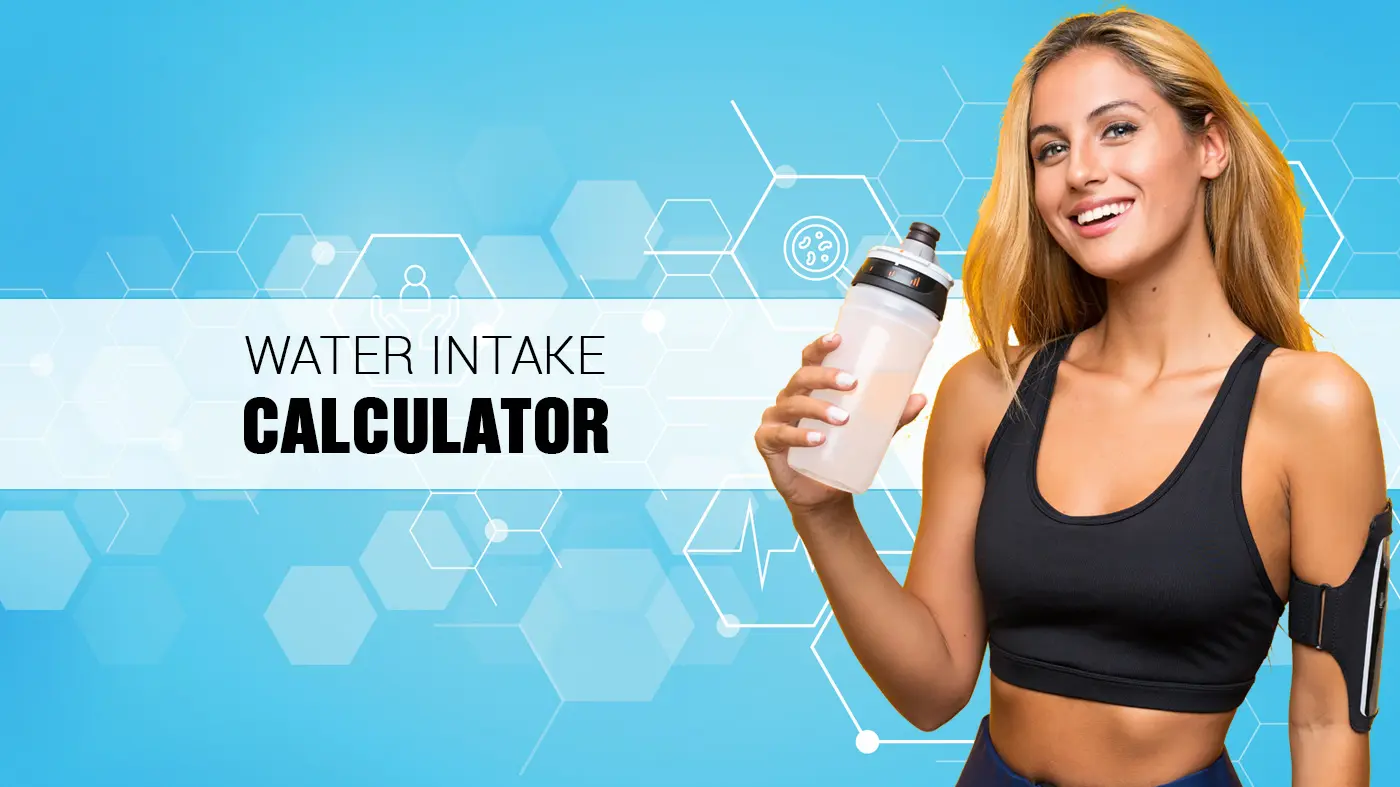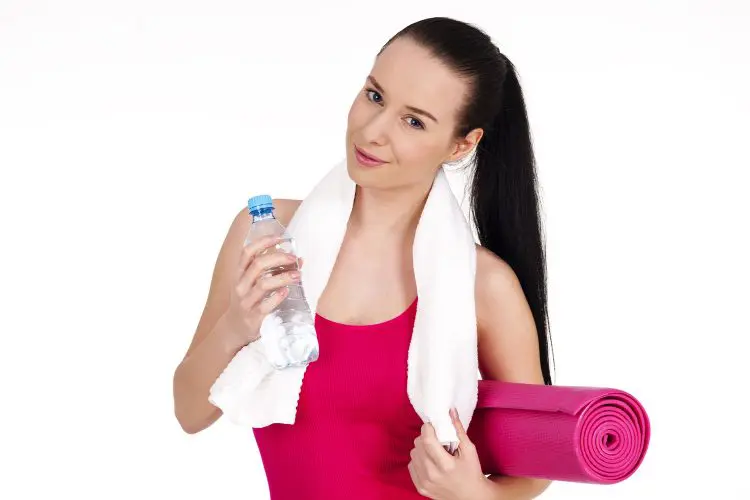The water intake calculator can help you determine your ideal daily water consumption. It’s a very handy, simple-to-use tool that anyone can use to ensure proper hydration, which is a crucial component of good health and performance. Keep reading to learn more about how this calculator works and why you need to drink plenty of water every day!
Result:
Why Do I Need To Know How Much Water To Drink?
Water is life…
The average adult body is about 60 percent water. Although, babies have more water than adults and men have more water than women. The reason being is that fat tissue contains less water than lean tissue and women tend to carry more body fat on average (1).
But everything from the brain to the heart, lungs, kidneys, bones, and muscles contain water.
Therefore, without a sufficient intake of water, the body cannot function properly. But if you go too long without any water at all, death would eventually ensue.
In fact, you’ve probably heard that humans can survive quite a bit longer without food than without water and that’s 100% true. How long exactly? Well, we couldn’t tell you because there are many factors that you’d have to take into consideration.
Not to mention, it’s ethically unacceptable to perform starvation studies on human beings. Although research has been done on this subject and real-world situations (fasts, hunger strikes, etc) have given us an idea. We’ve all heard stories and watched documentaries on people who survived out in the wilderness or were in a situation where there was no food or water for weeks and even months (there’s your answer in short).
One scientific review that considered the accounts of real-life survival experiences mentioned that it’s possible to survive within a span of 8-21 days without both water and food, and closer to two months consuming water only (2).
This sounds about right and is as accurate an average estimate as it gets based on what we’ve always sort of been told. But again, there are lots of factors such as water quality and quantity, nutrition or lack thereof, environment, level of physical activity, health conditions, pregnancy, etc.
Recommended water to drink every day
Following table shows the recommended water intake for a range of weights, remember to adjust for your activity level.
| Weight | Daily Water Daily | ||
|---|---|---|---|
| Pounds | Ounces | Cups | Liters |
| 100 | 67 | 8.37 | 1.98 |
| 110 | 74 | 9.25 | 2.18 |
| 120 | 80 | 10 | 2.36 |
| 130 | 87 | 10.87 | 2.57 |
| 140 | 94 | 11.75 | 2.77 |
| 150 | 100 | 12.5 | 2.95 |
| 160 | 107 | 13.37 | 3.16 |
| 170 | 114 | 14.25 | 3.37 |
| 180 | 121 | 15.12 | 3.57 |
| 190 | 127 | 15.87 | 3.75 |
| 200 | 134 | 16.75 | 3.96 |
| 210 | 141 | 17.62 | 4.16 |
| 220 | 148 | 18.5 | 4.37 |
| 230 | 154 | 19.25 | 4.55 |
| 240 | 161 | 20.12 | 4.76 |
| 250 | 168 | 21 | 4.96 |
Negative effects of dehydration
OK, so we talked a little about how crucial water is for staying alive. But a much more common problem is dehydration.
The good news though, is that it’s easy to determine whether or not you’re getting enough water by simply paying attention to your body and the color of your urine.
The most common symptoms of dehydration or not drinking enough water include:
- Dark yellow urine
- Feeling of thirst
- Lack of urination
- Constipation
- Low energy/fatigue
- Dry skin and lips
- Headache
Another way to tell if you’re dehydrated, especially if you’re an athlete or someone who exercises regularly, is by your strength, power, or endurance performance. Just a small 1-2% decrease in body weight from a loss of fluids can have a significant impact on your mental and physical performance (3, 4).
You may also feel dizzy and faint, although this isn’t always related to dehydration. Then there are other symptoms related to more serious health issues which is why it’s just important to make sure you drink lots of water every single day!
What Is The Water Intake Calculator and How Does It Work?
The water intake calculator uses a formula to estimate an individual’s ideal daily water intake based on their body weight (lbs or kg) and exercise duration.
How to calculate your water intake
While the calculator is super easy to use and does all the work for you, it never hurts to know how the results are calculated by using the formula.
A general recommendation is that most people should drink about 2/3 of their body weight (lbs) in ounces per day.
To estimate your ideal daily intake, you’ll first take your weight and multiply it by 2/3. This will give you an estimate of the ideal water intake based on your body weight alone.
For example, if you weigh 140 pounds, you’ll multiply that by 2/3.
- 140 x 2/3 = 93 ounces
However, as mentioned, our water intake calculator also factors in the duration of physical activity (you must input this information), and for every 30 minutes of activity, you’ll add 12 ounces of water.
So let’s say you did 30 minutes of activity.
- 140 x 2/3 + 12 = 105. You’ll drink 105 ounces of water per day.
But let’s say you did 45 minutes of exercise. You’d then have to add 18 or 12 x 1.5.
- 140 x 2/3 +18 (or 12 x 1.5) = 111. You’ll drink 111 ounces per day.
The calculator will also generate your results in liters and cups too which is quite convenient.
How Much Water/Liquid Does The Average Person Need?
There’s no one-size-fits-all recommendation for maintaining appropriate hydration levels because there are various factors to consider. However, ensuring that water intake is adequate does not have to be a complex process (it really isn’t).
And, in fact, consistency is key when it comes to proper hydration.
Water, like food, is something that we need throughout the day to maintain good health and energy. And depending on your age, gender, weight, diet, environment, activity levels, and physical health, you must ensure that you’re consistently replenishing lost fluids.
This calculator doesn’t factor in all of the possible variables that may affect hydration levels, however, it’s not necessary in most cases. Your body weight and activity level are typically sufficient to provide a good estimate.
But if we had to give an answer as to the ideal water intake for men and women; research has shown us that men should consume at least 3 liters per day and women should consume at least 2.2 liters per day.
Based on recommendations by the U.S. National Academies of Sciences, Engineering, and Medicine, an adequate daily fluid intake is:
- About 15.5 cups (3.7 liters) of fluids a day for men
- About 11.5 cups (2.7 liters) of fluids a day for women
You’ve probably also heard the common recommendation to drink eight, 8oz (64 ounces) glasses of water per day. This is certainly a good place to start and may be ideal for a lot of people. However, it’s not necessarily ideal for everyone.
You also have to keep in mind that many food items contain varying amounts of water such as fruits, vegetables, dairy products, coffee, and even meats, fish, and eggs in smaller amounts. In fact, roughly 20% of the water that most people consume in their diets comes from foods and other liquids (5).
If you’re not as active of an individual, you’re more likely to be fine paying attention to common symptoms of dehydration. But if you’re someone who’s very active, especially in a hot environment, you’re going to need to drink a lot more water on a daily basis.
And you shouldn’t wait to feel thirsty either before drinking water, just like you don’t wait to get cavities to start brushing and flossing your teeth.
Active individuals and those in hotter environments will especially benefit from loading up on water before engaging in activities that will make them sweat, in addition to during and after (6). But a healthy sports drink whether store-bought or homemade; will provide the essential salts/electrolytes that help keep water in the cells/body.
That’s why athletes drink Gatorade during training or a sporting event. However, most types of water contain important minerals too, and drinking plain water is important throughout the day.
What Can I Do To Drink More Water?
There are many effective strategies that anyone can use to ensure that they’re drinking enough water on a daily basis. And as crazy as it may sound, it can be extremely difficult to stay on track with consistent water intake if you don’t have a plan or a routine.
You’re probably aware of the power and importance of developing and maintaining good habits. Well, your habits are going to be key as they are when it comes to sticking to anything in life.
Here are some strategies that you can use…
Add flavor
Drinking plain water every day can be unappealing sometimes just like eating the same food over and over again every day starts to lose its appeal after a while. And maybe it could be that we’re just too spoiled by having so many beverage choices.
But whatever helps you to drink more fluids, right?
Some lemon and natural sweetener can turn that tasteless water into a healthy lemonade that you can drink throughout the day. But there are also flavor packets that are super convenient and require no preparation other than mixing.
Whatever you use to flavor your water with though, it should be very low to no sugar. We don’t recommend drinking regular sodas and sugar-laden teas or juices like Capri Suns to meet your recommended daily water intake.
Set an alarm or use an app
We set alarms or reminders for everything, so why not set one to remind us to drink water. Many times we just get too distracted to be bothered with grabbing a pre-filled bottle or pouring some in a cup. Heck, it’s not uncommon to have water in front of you and still not drink it.
Setting a reminder does more to keep us accountable because we know that the whole point of doing that is to create good habits. It’s all about doing the little things that can make the biggest difference. And it’s not like you have to be bothered with setting an alarm every day because, with current technology, we have the option to set it and forget it (just don’t forget to drink your water or liquid of choice).
An app like Gulps can be extremely useful as it’ll send reminders to your phone and show visuals of your intake which is pretty neat.
Get an accountability partner
Whether it’s your workout buddy, family member, or someone that you communicate with virtually, find someone that’ll hold you accountable and you could do the same for them. Life is all about helping and encouraging each other to be better and healthier.
Make it a habit to take water with you everywhere you go
It’s always a good idea to take water or your favorite healthy beverage (that’s right you read correctly, a “healthy beverage”…) anywhere that you go. Not only are you more likely to drink water when you have to hold a bottle or cup in your hand, but you may find yourself in a situation where you don’t have access to water and you’ll be happy you had it.
Treat yourself to a cool bottle
Chances are if you have a bottle that you really fancy for carrying around your fluids (that doesn’t sound right but oh well let’s go with it), you’ll be more willing or excited to drink from it.
There are so many different shapes, sizes, and bottle designs that you should consider treating yourself to one that you’d like to use all the time!
Remember why you’re drinking water
Did you notice how we provided lots of useful information on the importance of drinking enough water? That’s because we want you to use this article as a reminder and resource. When you know and understand why you’re doing something, then you’re much more likely to ensure that you actually do it!
Related: 10 Best Shaker Bottles Reviewed for 2024
Drink shakes and smoothies
I’d be willing to bet that you hardly miss a tasty protein shake or smoothie…
Get yourself a good protein powder mix and start making more shakes and smoothies. Mix in your favorite ingredients with some water, milk, or plant-based liquids. Not only can you satisfy a sweet tooth but shakes and smoothies typically require a decent amount of liquid for blending or mixing.
Will Drinking More Water Help Me To Lose Weight?
In short, yes. Being sufficiently hydrated is associated with weight loss. How? Well, that’s a little more complicated because there are a few different mechanisms responsible.
For one, adequate fluid intake takes up room in the stomach that sends a signal to the brain that you’re full or near it (7). Therefore, you simply won’t be able to eat as much, and this reduction in overall calories helps to drop pounds.
One 12-week study of overweight/obese middle-aged and older adults found that drinking 17 ounces or 500ml of water eating resulted in 44% more weight loss than a group who did not drink water beforehand. (8).
Water is also important for lipolysis which is when fats are broken down in the body. It can help to boost the metabolism resulting in more calories burned.
Dehydration has shown to increase the risk of chronic diseases such as diabetes, obesity, cardiovascular disease, and cancer. The body cannot function as it should when the body is at dis-ease, and during times of illness, the body needs more water and it’s easier to become dehydrated.
The takeaway here is that staying hydrated can certainly help you to maintain a healthy body weight.
Other related calculators
- Creatine Calculator
- Carb Cycling Calculator
- Intermittent Fasting Calculator
- Water Fasting Weight Loss Calculator
- Weight Gain Calculator
- Macro Calculator
- Fat Intake Calculator
- Protein Calculator
Wrapping Up
The water intake calculator is a pretty awesome tool, wouldn’t you say so? Just type in your weight and minutes of exercise and you get an instant estimate of how much water you should be drinking every day.
But it’s also important that you remember there are other factors that affect your hydration levels too. Any types of extremes (environmental temperature, health, etc) may require a higher water intake and in some cases, you may not need as much.
But as mentioned, you can easily tell whether or not you’re intaking enough fluids by paying attention to your body.
References
Fitness Volt is committed to providing our readers with science-based information. We use only credible and peer-reviewed sources to support the information we share in our articles.
- The Water in You: Water and the Human Body | U.S. Geological Survey. (2019, October 22). The Water in You: Water and the Human Body | U.S. Geological Survey.
- Kottusch P, Tillmann M, Püschel K. Oberlebenszeit bei Nahrungs- und Flüssigkeitskarenz [Survival time without food and drink]. Arch Kriminol. 2009 Nov-Dec;224(5-6):184-91. German. PMID: 20069776.
- S. (2020, July 3). The Effects of Hydration on Athletic Performance. SportsCardiologyBC.
- Impact of Mild Hypohydration on Muscle Endurance, Power,. . . : The Journal of Strength & Conditioning Research. (n.d.). LWW.
- How Much Water Do You Need? (n.d.). How Much Water Do You Need?
- Adams JD, Sekiguchi Y, Suh HG, Seal AD, Sprong CA, Kirkland TW, Kavouras SA. Dehydration Impairs Cycling Performance, Independently of Thirst: A Blinded Study. Med Sci Sports Exerc. 2018 Aug;50(8):1697-1703. doi: 10.1249/MSS.0000000000001597. PMID: 29509643.
- Thornton SN. Increased Hydration Can Be Associated with Weight Loss. Front Nutr. 2016 Jun 10;3:18. doi: 10.3389/fnut.2016.00018. PMID: 27376070; PMCID: PMC4901052.
- Dennis EA, Dengo AL, Comber DL, Flack KD, Savla J, Davy KP, Davy BM. Water consumption increases weight loss during a hypocaloric diet intervention in middle-aged and older adults. Obesity (Silver Spring). 2010 Feb;18(2):300-7. doi: 10.1038/oby.2009.235. Epub 2009 Aug 6. PMID: 19661958; PMCID: PMC2859815.
Tip: If you're signed in to Google, tap Follow.










